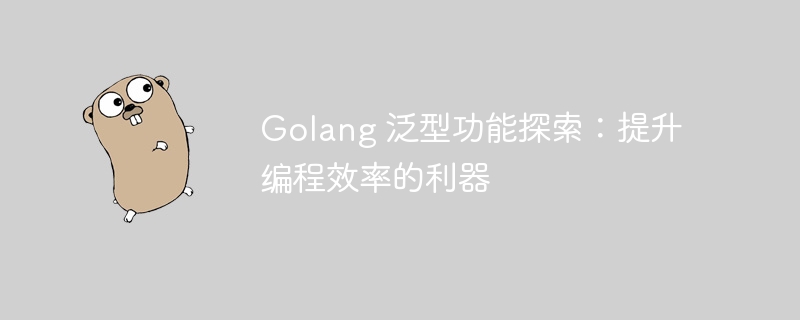

As the field of software development continues to develop, the functions of programming languages are constantly being improved and updated. Among them, Golang is a programming language that attracts many developers and is highly praised for its simplicity and efficiency. However, Golang’s shortcomings in generics have long been a criticism of many developers. Therefore, the Golang team launched the generic function in the latest version, providing a new impetus for the development of Golang.
Since its release, Golang has been receiving widespread attention for its fast, efficient, easy to learn and use features. However, because it does not support generics, it causes code redundancy and duplication in some scenarios, reducing development efficiency. Therefore, the Golang team decided to introduce generics functionality in future versions to solve this problem.
In Golang version 1.18, the generic function was officially introduced, providing developers with more flexible and powerful programming capabilities. Through generics, developers can write more versatile and concise code, which improves code reusability and maintainability, thereby improving programming efficiency.
In Golang, the use of generics mainly includes two aspects: generic functions and generic types.
package main
import "fmt"
// 定义一个泛型函数
func contains[T any](slice []T, item T) bool {
for _, s := range slice {
if s == item {
return true
}
}
return false
}
func main() {
ints := []int{1, 2, 3, 4, 5}
fmt.Println(contains(ints, 3)) // 输出 true
strings := []string{"apple", "banana", "cherry"}
fmt.Println(contains(strings, "orange")) // 输出 false
}package main
import "fmt"
type Stack[T any] struct {
items []T
}
func (s *Stack[T]) Push(item T) {
s.items = append(s.items, item)
}
func (s *Stack[T]) Pop() T {
if len(s.items) == 0 {
return nil
}
item := s.items[len(s.items)-1]
s.items = s.items[:len(s.items)-1]
return item
}
func main() {
stack := Stack[int]{}
stack.Push(1)
stack.Push(2)
fmt.Println(stack.Pop()) // 输出 2
strStack := Stack[string]{}
strStack.Push("hello")
strStack.Push("world")
fmt.Println(strStack.Pop()) // 输出 world
}As can be seen from the above code example, the generic function makes the code more versatile and flexible, while reducing the code Repeated writing improves development efficiency.
Golang, as a mature and widely used programming language, has ushered in new development opportunities after the introduction of generic functions. The introduction of generic functions improves code reusability and maintainability, making development more efficient and convenient. Through specific code examples, you can understand the usage and advantages of generic functions more clearly, so that they can be better applied in actual project development.
With the continuous improvement and popularization of Golang's generic functions, I believe it will bring more innovation and development to the Golang community and promote the wider application of Golang in software development. We hope that Golang’s generic function will become a powerful tool for developers to improve programming efficiency and bring more innovation and progress to the software development industry!
The above is the detailed content of Golang generic function exploration: a powerful tool to improve programming efficiency. For more information, please follow other related articles on the PHP Chinese website!
 How to define variables in golang
How to define variables in golang
 What are the data conversion methods in golang?
What are the data conversion methods in golang?
 What are the commonly used libraries in golang?
What are the commonly used libraries in golang?
 What is the difference between golang and python
What is the difference between golang and python
 what is internet.exe
what is internet.exe
 How to solve problems when parsing packages
How to solve problems when parsing packages
 The difference between unix and linux
The difference between unix and linux
 Which is more difficult, c language or python?
Which is more difficult, c language or python?




